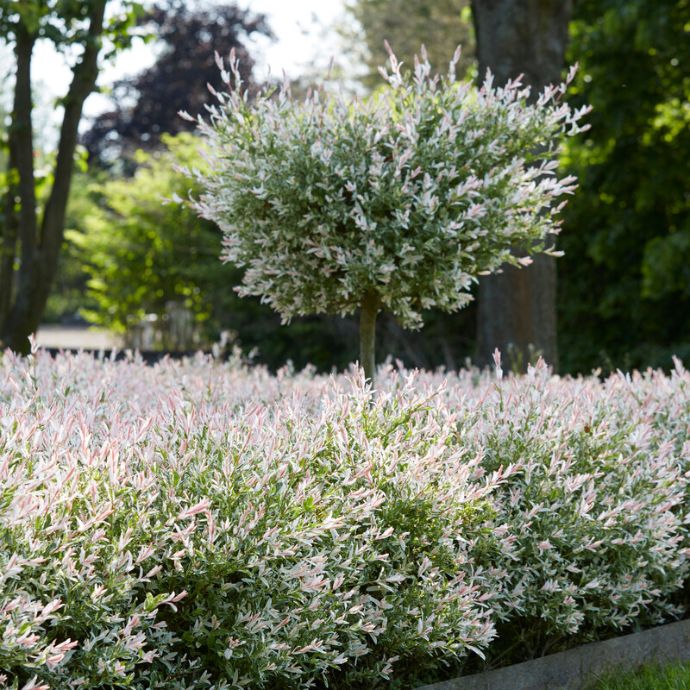Advice & Inspiration
Deer-Resistant Plants

Oh deer dear, it looks like something’s been at the viburnum again… They may be adorably cute, but deer can be a bloomin’ nightmare when it comes to nibbling on garden plants. Still, they’re a darn sight prettier than slugs… The UK is home to several deer species, including the native red and roe deer, as well as fallow, sika and muntjac deer.
Inquisitive by nature and often peckish to boot, it’s not unheard of for deer to wreak havoc on carefully-curated gardens. It’s worth knowing, therefore, just how to deter them, and in this blog post that’s exactly what we’ll be covering.
Jump to:
Why do deer like garden plants?
Deer are herbivores and like to try new plants. So, that flower bed of yours? The one full-to-bursting with different shrubs, fruits and perennials? That’s like an all-you-can-eat buffet to these curious creatures. Plus, think about it – if you had the choice between eating the same ol’ food day in, day out, and mixing things up with something new and different, what do you think you’re going to pick?

What plants don’t deer like?
While they may be pretty voracious with their plant grazing (or, more accurately, browsing), there are a number of plants that deer steer clear (a triple rhyme?!) of, and these tend to be thorny, toxic or simply taste bad (or too strong). That said, even some spiky and poisonous plants aren’t safe from these munching mammals.
Anecdotal evidence suggests that deer can eat prickly holly bushes and chow down on plants that other animals find unsafe. Regardless, opting for the plants we’ve listed in the next section will invariably stand your garden in better stead than other plants, if you know deer to be a problem in your local area. The following plants are all thought to be at least somewhat deer-resistant, and look fabulous too!
- Cornus kousa (kousa dogwood)
- Digitalis (foxglove)
- Echinops (globe thistle)
- Euphorbia (spurge)
- Forsythia (golden bells)
- Ginkgo (maidenhair tree)
- Helleborus (hellebore)
- Laurus nobilis (bay tree)
- Lavandula (lavender)
- Liquidambar (sweetgum tree)
- Lonicera (honeysuckle)
- Mentha (mint)
- Origanum (oregano)
- Paeonia (peony)
- Primula (primrose)
- Rheum x hybridum (rhubarb)
- Ribes uva-crispa (gooseberry)
- Salvia (sage)
Protecting your garden from deer
Even if you choose a selection of plants specifically for deer deterrent purposes, there still might be the odd, adventurous (or foolhardy) deer that will give them a go. There are a couple of strategies you can employ, however, if you want to keep these four-legged trespassers from getting at your horticultural hard work.
Fencing
The most common way to protect your garden from deer is to install some fencing. Now, deer can jump pretty high so it’s important that your fence is of a good height. A couple of metres is tall enough to stop all but the most athletic of deer, while the mesh size for the wire will depend on the particular species of deer you’re trying to keep out.
Plant protection
If you don’t fancy constructing an entire fence – or it isn’t feasible for whatever reason – then you can also give your plants some individual protection. This is particularly beneficial for young trees and saplings, which deer are particularly partial to feeding on. There are plenty of tree guard options available, including metal and biodegradable, plastic-free options.
Hedging
Another option is to plant a hedge, using species that deer aren’t likely to try and eat their way through. A simple and traditional box hedge is a good choice here, likewise a Japanese barberry hedge, whose spiny thorns mean deer typically give this plant a wide berth. If you want to push the boat out even further, then constructing a hedge from lavender plants is something you could consider.
Repellent spray
A quick (and easy) solution is to purchase a purpose-formulated deer repellent spray and give your plants a spritz. Trico® Garden is absolutely harmless to deer, but smells and tastes bad to them, while also having the added benefit of not being washed off by rain, making it a great choice for British winters.
Other options
Honourable mentions go to erecting a scarecrow in your garden, which can act as a visual deterrent, or an ultrasonic device, whose high-frequency sound can be effective in stopping deer. Long-term efficacy of these two options is questionable, however, so we’d recommend trying the other tactics mentioned in this list before resorting to these.
Get a dog!
Okay, so admittedly this is a bit of a tongue-and-cheek entry, because realistically, if you’re getting a dog solely for the purpose of keeping deer away, then the real question is – really? But if you already have a dog, then you’re quids in as deer are unlikely to risk an encounter with your fido just for the sake of an afternoon snack.

Final thoughts
While you can never fully deer-proof your garden, implementing some of the steps highlighted above can put you on the front foot against these fleet-of-foot foragers. If you want to see some deer for yourself – and not in your own back garden – then consider a visit to one of Britain’s many parks and estates home to this much-loved animal. You can expect to see various deer species at Dunham Massey Hall, Richmond Park, Bushy Park, Chatsworth Park and Helmingham Hall, to name just a few.

























